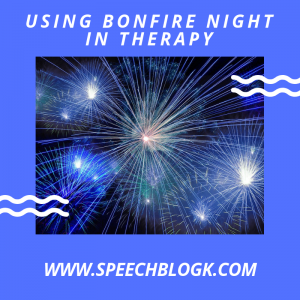
I know not everyone likes fireworks and that the actual reason we celebrate Bonfire Night is tricky, so this post may not be for everyone. But I love this time of year, except the getting dark really early bit! There are so many different things happening that prove to be great opportunities for discussion with children. We have Hallowe’en and Bonfire Night in the next few weeks and then before you know it, Christmas will arrive! Then you also have the currently rather confused British weather and changing seasons. Talking about things that your child has experienced normally evokes better, more spontaneous language and is so useful as talking outside of the ‘here and now’ is an incredibly important skill that many children find hard.
Why I talk about Bonfire Night in therapy
I personally LOVE fireworks and Bonfire Night (For our American readers this is the English celebration of Guy Fawkes being stopped from blowing up parliament and killing the Prime Minister back in 1605!). We always go to at least one firework display each year.
I also love talking about fireworks to the children I work with. It can provoke an interesting range of gestures, signs and words to describe them. With younger children, it may be a child excitedly waving their arms around to show you they saw a Catherine Wheel, or lots of ‘fizz’, ‘pops’ and ‘bangs’. I am working with some very inventive Makaton signers at the moment who love making up new signs for things – their version of fireworks was fantastic and I can’t do it justice in writing!! It might also be a child covering their ears and saying ‘no’ – not everyone shares my love of noisy fireworks!
With older children, I have had discussions about Guy Fawkes, the gunpowder plot and tried to describe what treason is. It doesn’t matter what level your child is at, they can still join in and discuss a shared experience. Hopefully you will find they become more animated and can generate some good vocabulary! So what else can you talk about?
For younger children
- Colours: Fireworks come in a great selection of colours and you can easily reinforce and talk about the colours you are seeing. You could also include some harder language, like commenting on which colour was your favourite and asking your child which they liked best.
- Noisy and loud: Most firework displays are noisy although you can find some family friendly ones without the loud bangs! You might also want to talk about quiet vs. loud before you go and possibly try some ear defenders! Many children enjoy the colours and shapes and not the noise!
- Adjectives: Try and think of as many good describing words as you can – did the fireworks fizz or bang? Did they sparkle? Were they shiny and colourful? Did the bonfire crackle and was it hot?
- Dark vs. light: you can talk about the dark night sky, but the bright and light bonfire and fireworks. With some help your child might be able to answer questions about why we only have fireworks at night and talk about if we could see them in the day time?
- Sequencing: the next day, you can talk about what you did – getting your coats and gloves on, did you walk or drive there, waiting for them to start and then watching them. Encourage your child to talk about the order of events. You could also take pictures to help with retelling the story later.
- Acceptance: We don’t all like the same things and that is fine! Not every child like fireworks, so instead you could talk about which books you are going to read instead or what your family will do when those noisy fireworks are on!
- Safety: This goes for all children. Fireworks are for grown ups to handle. They are not toys etc Again approach this at a level appropriate for your child – be it “No touching” or more of a discussion of why.
For older children
- Adjectives: But this time we expect harder ones! Did the fireworks shimmer and fade? Did they cascade out of the sky? You could encourage your child to look in a dictionary to try and find good words to describe what they saw.
- The Gunpowder plot: At a level appropriate for your child (not every child likes the hanging, drawing and quartering bit of the story, but some do!) explain about why we celebrate bonfire night and what Guy Fawkes was trying to do. Talk through the who, where, when and why of the story. Discuss tricky words like treason – again encourage your child to use dictionaries for the hard bits!
- Science: You can ask your child if they would be able to see the fireworks in day light? And why we have them in the dark. You then have the issue my son asked me this year “How do fireworks go up so fast” – this led to a discussion about reactions and explosions! Don’t worry if you’re not sure yourself, just make time to sit down with your child and find out together – As my son also says “Lets Google it Mum!”
What else do you talk about with your children at this time of year?






Leave a Reply